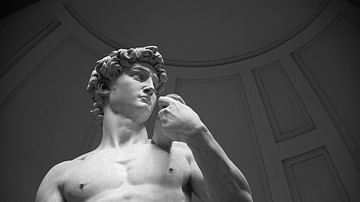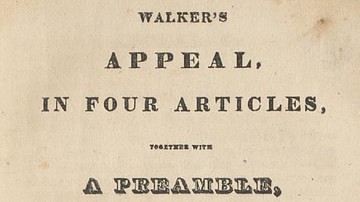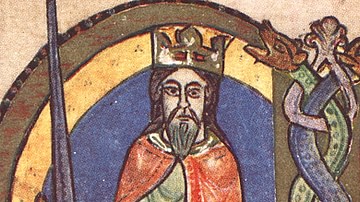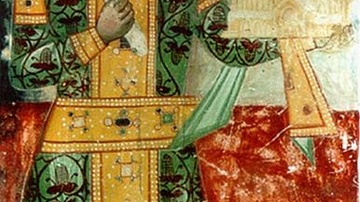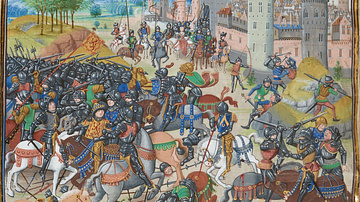David Walker (l. c. 1796-1830) was an African American abolitionist writer best known for his 1829 work An Appeal to the Coloured Citizens of the World (also known The Appeal or Walker's Appeal) advocating for a united front in the abolition of slavery and noting the hypocrisy of White Americans holding slaves in the "land of the free."

The Appeal is considered the most radical anti-slavery work written by an African American during the slave-holding era of US history. His advocacy of violence as justified in overthrowing the "peculiar institution" of slavery, as it was sometimes referred to, caused abolitionist William Lloyd Garrison (l. 1805-1879) to reject it, although Walker's work may have inspired Garrison to begin publishing his abolitionist newspaper The Liberator in 1831.
There has also long been speculation that Walker's work directly or indirectly led to Nat Turner's Rebellion of 1831 in Southampton County, Virginia. Even though there is no evidence that Turner, an educated slave, ever read Walker, he would not have needed to as the contents of The Appeal were widely disseminated throughout the South by sailors (and others) from the North who smuggled the pamphlet into slave-holding states, where it was quietly read to sympathetic audiences and discussed. The Appeal caused such great concern among slaveholders that stricter anti-literacy laws were passed, among other measures restricting social gatherings of slaves and travel or congregations of free Blacks.
Abolitionist and former slave Frederick Douglass (l. c. 1818-1895) greatly admired The Appeal and later drew on it in his speeches, and, although Garrison publicly distanced himself from Walker's more radical suggestions, the work also informed aspects of The Liberator throughout its publication. Walker's work influenced and was cited by Malcolm X (l. 1925-1965) and Dr. Martin Luther King, Jr. (l. 1929-1968), among many other civil rights leaders of the 1950s-1960s up through today. The Appeal is recognized as one of the most important documents concerning slavery in the United States ever written and still carries considerable weight in discussions of human rights in the USA and elsewhere.
Life & Family
David Walker was born to a free mother and an enslaved father in Wilmington, North Carolina, in either 1796 (the date most scholars agree on) or 1785. In keeping with the law, since his mother was free, he was, too. There is no information on his early life, but, as a young man, he left home and moved to Charleston, South Carolina, where he joined the African Methodist Episcopal Church (AME), the first Black denomination in the United States, which advocated for activism against slavery. Here, he is thought to have heard the lectures of Denmark Vesey (l. c. 1767-1822), the organizer of a slave revolt in Charleston in 1822, which was betrayed before it could be set in motion.
Vesey was hanged, along with five others, on 2 July 1822 – even though there was no evidence, only hearsay, to convict any of them of organizing a slave revolt – and Walker, then in his 20s, may have been present, leaving Charleston afterwards, or he may have left earlier. He was living in Philadelphia in the early 1820s and was a resident of Boston by 1825. He married one Eliza Butler in 1826, and the couple had a daughter, Lydia Ann. Walker opened a used clothing store near the docks of Boston, gave anti-slavery lectures, and helped runaway slaves and the poor of the city.

By 1827, he was writing for the African American-owned Freedom's Journal and may have started writing The Appeal, which was published, at his expense, in 1829. Knowing the work would be confiscated and destroyed if sent through regular channels to the South, Walker enlisted the assistance of sympathetic sailors, both Black and White, to carry The Appeal to Southern ports. He also used his clothing shop to effect by sewing The Appeal into the lining of jackets to be unwittingly carried south.
His distribution plan was evidently a great success since slave-holding states, such as Georgia, condemned and banned the work in 1830, enacting laws to prevent Black sailors from disembarking ships from the North in their ports. A reward was issued by the Georgian authorities of $10,000.00 to anyone who could bring Walker before them alive or $1,000 for his corpse. His friends encouraged him to flee to Canada, but he refused, claiming he would die for the cause of abolition.
He was found dead on 6 August 1830, which led to speculation he had been poisoned (a claim still made today). Actually, he died of tuberculosis, which had also claimed his daughter's life only a week before. He was buried in an unmarked grave in South Boston, and his wife, unable to make payments on their home, lost it. Their son, Edward G. Walker (l. 1830-1901), was born after Walker's death and would later become a lawyer and then State Legislator in Massachusetts.
The Appeal
The Appeal draws on scripture, history, and Walker's own experiences to condemn slavery and advocate for its abolition. The work is informed by the biblical Book of Exodus, presenting White Americans as the Egyptians who, according to that story, enslaved the Israelites, and Black slaves as the Hebrews who were led to freedom by Moses. Walker writes:
I promised in a preceding page to demonstrate to the satisfaction of the most incredulous, that we, (coloured people of these United States of America) are the most wretched, degraded and abject set of beings that ever lived since the world began, and that the white Americans having reduced us to the wretched state of slavery, treat us in that condition more cruel (they being an enlightened and Christian people), than any heathen nation did any people whom it had reduced to our condition. These affirmations are so well confirmed in the minds of all unprejudiced men, who have taken the trouble to read histories, that they need no elucidation from me.
But to put them beyond all doubt, I refer you in the first place to the children of Jacob, or of Israel in Egypt, under Pharaoh and his people. Some of my brethren do not know who Pharaoh and the Egyptians were–I know it to be a fact, that some of them take the Egyptians to have been a gang of devils, not knowing any better, and that they (Egyptians) having got possession of the Lord's people, treated them nearly as cruel as Christian Americans do us, at the present day.
(9-10)
In support of his argument for the abolition of slavery and equal rights for all, Walker cites conversations with others, topical events reported in papers, his own experiences, precedent from world history, the Bible, and the foundational document of the United States, the Declaration of Independence, which leads to his conclusion. Scholar Eugene D. Genovese comments:
David Walker, in his famous Appeal, attacked colonization as designed to separate resourceful and intelligent free Negroes from the slaves whom they could teach and lead. He added that the whites recognized how disturbing the mere presence of free black men was to the slave system.
(410)
Throughout the work, Walker advocates for greater educational efforts among Black communities and acceptance as equals by White ones. If equality and basic human rights were not to be given by the Whites, Walker says, then armed revolt should be regarded as the only just course. This line of argument, according to some scholars, is what may have inspired the Turner Rebellion of 1831 and is referenced in the interviews and speeches of Malcolm X, published as By Any Means Necessary in 1970.
Text
The following is taken from the Third and Last Edition of The Appeal published in 1830 as Walker's Appeal, In Four Articles; Together With A Preamble, To The Coloured Citizens of the World, But In Particular, and Very Expressly, To Those Of The United States of America, Written in Boston, State of Massachusetts, September 28, 1829.
The version below is the Electronic Edition from the site Documenting the South (https://docsouth.unc.edu/nc/walker/walker.html) cross-checked with David Walker's Appeal to the Coloured Citizens of the World (2000), edited by Peter P. Hinks.
The section most often anthologized are the passages from pages 19-21, 23-24, and 29-30. The section citing the Declaration of Independence on pages 85-86 is not always included. The following are the best-known excerpts from the piece; the whole work will be found below in the bibliography and External Links section.
(from pp.19-21): It is time for me to bring this article to a close. But before I close it, I must observe to my brethren that at the close of the first Revolution in this country, with Great Britain, there were but thirteen States in the Union, now there are twenty-four, most of which are slave-holding States, and the whites are dragging us around in chains and in handcuffs, to their new States and Territories to work their mines and farms, to enrich them and their children–and millions of them believing firmly that we being a little darker than they, were made by our Creator to be an inheritance to them and their children forever–the same as a parcel of brutes.
Are we MEN!!–I ask you, O my brethren! are we MEN? Did our Creator make us to be slaves to dust and ashes like ourselves? Are they not dying worms as well as we? Have they not to make their appearance before the tribunal of Heaven, to answer for the deeds done in the body, as well as we? Have we any other Master but Jesus Christ alone? Is he not their Master as well as ours? –What right then, have we to obey and call any other Master, but Himself? How we could be so submissive to a gang of men, whom we cannot tell whether they are as good as ourselves or not, I never could conceive. However, this is shut up with the Lord, and we cannot precisely tell–but I declare, we judge men by their works.
The whites have always been an unjust, jealous, unmerciful, avaricious and blood-thirsty set of beings, always seeking after power and authority.–We view them all over the confederacy of Greece, where they were first known to be anything, (in consequence of education) we see them there, cutting each other's throats–trying to subject each other to wretchedness and misery–to effect which, they used all kinds of deceitful, unfair, and unmerciful means. We view them next in Rome, where the spirit of tyranny and deceit raged still higher. We view them in Gaul, Spain, and in Britain. –In fine, we view them all over Europe, together with what were scattered about in Asia and Africa, as heathens, and we see them acting more like devils than accountable men. But some may ask, did not the blacks of Africa, and the mulattoes of Asia, go on in the same way as did the whites of Europe. I answer, no–they never were half so avaricious, deceitful, and unmerciful as the whites, according to their knowledge.
But we will leave the whites or Europeans as heathens, and take a view of them as Christians, in which capacity we see them as cruel, if not more so than ever. In fact, take them as a body, they are ten times more cruel, avaricious and unmerciful than ever they were; for while they were heathens, they were bad enough it is true, but it is positively a fact that they were not quite so audacious as to go and take vessel loads of men, women and children, and in cold blood, and through devilishness, throw them into the sea, and murder them in all kind of ways. While they were heathens, they were too ignorant for such barbarity. But being Christians, enlightened and sensible, they are completely prepared for such hellish cruelties.
(from pp.23-24): The whites want slaves, and want us for their slaves, but some of them will curse the day they ever saw us. As true as the sun ever shone in its meridian splendor, my color will root some of them out of the very face of the earth. They shall have enough of making slaves of, and butchering, and murdering us in the manner which they have. No doubt some may say that I write with a bad spirit, and that I, being a black, wish these things to occur. Whether I write with a bad or a good spirit, I say if these things do not occur in their proper time, it is because the world in which we live does not exist, and we are deceived with regard to its existence.—It is immaterial however to me, who believe, or who refuse–though I should like to see the whites repent peradventure God may have mercy on them, some however, have gone so far that their cup must be filled.
(from pp.29-30): The whites have had us under them for more than three centuries, murdering, and treating us like brutes; and, as Mr. Jefferson wisely said, they have never found us out–they do not know, indeed, that there is an unconquerable disposition in the breasts of the blacks, which, when it is fully awakened and put in motion, will be subdued, only with the destruction of the animal existence. Get the blacks started, and if you do not have a gang of tigers and lions to deal with, I am a deceiver of the blacks and of the whites… if you commence, make sure work–do not trifle, for they will not trifle with you–they want us for their slaves, and think nothing of murdering us in order to subject us to that wretched condition–therefore, if there is an attempt made by us, kill or be killed. Now, I ask you, had you not rather be killed than to be a slave to a tyrant, who takes the life of your mother, wife, and dear little children? Look upon your mother, wife and children, and answer God Almighty; and believe this, that it is no more harm for you to kill a man, who is trying to kill you, than it is for you to take a drink of water when thirsty; in fact, the man who will stand still and let another murder him, is worse than an infidel, and, if he has common sense, ought not to be pitied.
(from pp. 85-86): See your Declaration Americans!!! Do you understand your own language? Hear your language, proclaimed to the world, July 4th, 1776–"We hold these truths to be self-evident–that ALL MEN ARE CREATED EQUAL!! that they are endowed by their Creator with certain unalienable rights; that among these are life, liberty, and the pursuit of happiness!!" Compare your own language above, extracted from your Declaration of Independence, with your cruelties and murders inflicted by your cruel and unmerciful fathers and yourselves on our fathers and on us–men who have never given your fathers or you the least provocation!!!!!!
Hear your language further! "But when a long train of abuses and usurpation, pursuing invariably the same object, evinces a design to reduce them under absolute despotism, it is their right, it is their duty, to throw off such government, and to provide new guards for their future security."
Now, Americans! I ask you candidly, was your sufferings under Great Britain, one hundredth part as cruel and tyrannical as you have rendered ours under you? Some of you, no doubt, believe that we will never throw off your murderous government and "provide new guards for our future security." If Satan has made you believe it, will he not deceive you?*
* The Lord has not taught the Americans that we will not some day or other throw off their chains and handcuffs, from our hands and feet, and their devilish lashes (which some of them shall have enough of yet) from off our backs.
Do the whites say, I being a black man, ought to be humble, which I readily admit? I ask them, ought they not to be as humble as I? or do they think that they can measure arms with Jehovah? Will not the Lord yet humble them? or will not these very colored people whom they now treat worse than brutes, yet under God, humble them low down enough? Some of the whites are ignorant enough to tell us, that we ought to be submissive to them, that they may keep their feet on our throats.And if we do not submit to be beaten to death by them, we are bad creatures and of course must be damned, &c. If any man wishes to hear this doctrine openly preached to us by the American preachers, let him go into the Southern and Western sections of this country–I do not speak from hear say–what I have written, is what I have seen and heard myself. No man may think that my book is made up of conjecture–I have travelled and observed nearly the whole of those things myself, and what little I did not get by my own observation, I received from those among the whites and blacks, in whom the greatest confidence may be placed.
The Americans may be as vigilant as they please, but they cannot be vigilant enough for the Lord, neither can they hide themselves, where he will not find and bring them out.

